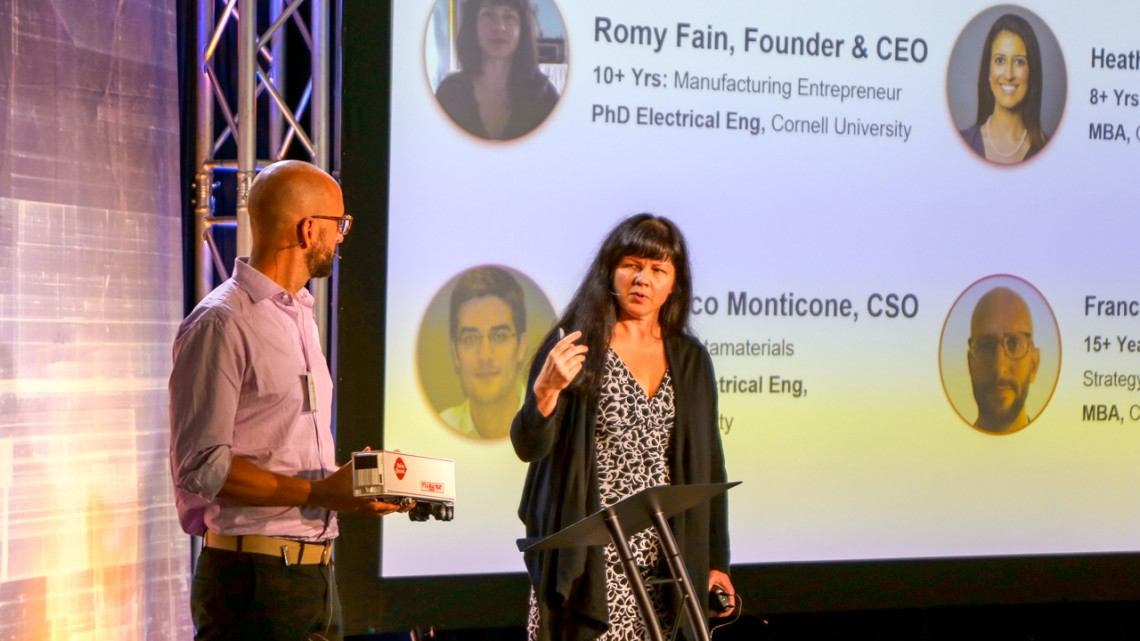
Romy Fain, Ph.D. ’17, right, founder and CEO of Heat Inverse, a sustainable cooling technologies company, presents with the company’s chief revenue officer, Franco Mora, MBA ’12, during the 76West Clean Energy Competition, held Aug. 7-8 at Binghamton University.
Alumni pitch green solutions in 76West energy competition
By David Nutt
Call it survival of the greenest – with a touch of Big Red.
This year’s 76West Clean Energy Competition brought together 19 technology startups – two of which were led by Cornell alumni – to pitch their cutting-edge ideas to spur clean energy solutions in the Southern Tier.
The presentations, Aug. 7-8 at Binghamton University, featured 19 semifinalist startups selected from a group of 169 applicants, based in 14 countries and 21 states. The winners will be announced in the fall.
The teams encompassed a range of clean-energy technologies, from energy storage and efficiency to transportation and renewables. Before the competition began, each team was paired with a mentor who helped them prepare their pitches. A panel of judges will recommend six finalists to split $2.5 million in prizes: a $1 million grand prize, a $500,000 award and four $250,000 awards.
Heat Inverse, an Ithaca-based company founded by Romy Fain, Ph.D. ’17, seeks to revolutionize cooling technologies and profitably reduce greenhouse gas emissions by making durable metamaterials that cool passively and increase the efficiency of systems like high-power electronics, power generation and storage, buildings and refrigerated truck trailers. Fain describes the technology as “air conditioning in a thin-film.”
“We had a great time in Binghamton last week, and thanks to the 76West mentor Brandon Wright and many others, we really brought our pitch to a new level with this competition,” Fain said. “We especially loved having a chance to meet the other 18 amazing companies working to save the planet.”
The competition helped Heat Inverse connect with potential partners and investors in the region. The company plans to create more than 80 new jobs in the Southern Tier over the next five years, according to Fain.
That kind of economic development is a crucial component of the competition, now in its fourth year. Winning companies must either move to the Southern Tier or establish a direct connection with the region’s economy through job creation or supply-chain partnerships. If companies are already local, they must commit to substantially growing their business and adding jobs in the region.
FlashCharge Batteries is headquartered in Miami, but chief technical officer Andrew Manning ’67, Ph.D. ’71, believes the company has the potential to successfully grow in New York state. FlashCharge is bringing to market a cylindrical supercapacitor that has four times the energy density of leading competitors, meaning it’s 75% smaller and less expensive, and it operates at a 58% higher voltage.
While its energy density is similar to lead-acid batteries, this supercapacitor charges 80 times faster, lasts 50 times longer and is nonflammable. It can be used for a variety of applications in aerospace and aviation industries, the military, electric vehicles and electric grids.
“It was certainly an honor to be among the finalists of this extensive group of very impressive entrepreneurs and startups,” Manning said. “I would have never realized the extent and scope of new businesses in the Southern Tier. New York state is definitely a leader in promoting new technologies and helping new businesses. Even if we don't receive a cash award, the support and introductions have been invaluable.”
Two other startups also featured Cornell connections: Stephen S. Koenigsberg, M.S. ’78, Ph.D. ’79 serves on the advisory board of Brooklyn-based Allied Microbiota; and Ben Littauer ’78 is an angel investor with Clean Fiber from Buffalo.
This year’s 76West competition – the name refers to the Southern Tier’s location at 76 degrees west longitude – was particularly timely, given the state’s Climate Leadership and Protection Act was signed into law last month. The law calls for an 85% reduction in greenhouse gas emissions by 2050 and economywide carbon-neutrality. The pioneering technologies pitched at 76West could turbocharge the state’s efforts to reach those goals.
“In the fourth year of 76West, we can really see the momentum growing, building toward the world-leading clean energy ecosystem we pictured when launching the program,” said Brian Bauer, director of clean energy program at the Cornell Center for Regional Economic Advancement. “76West participants are building their startups, creating jobs and addressing climate change in ways that can have global impact.”
Media Contact
Get Cornell news delivered right to your inbox.
Subscribe
